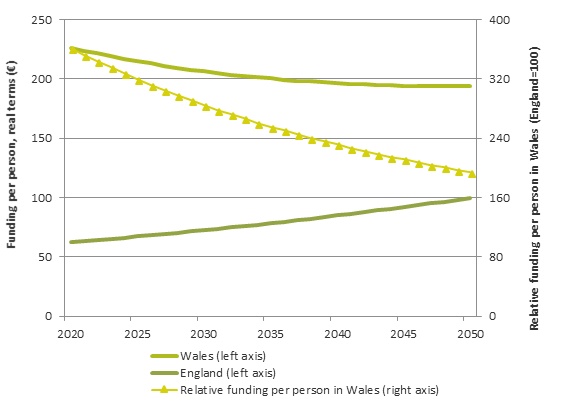14.06.18
On a cliff edge: The Barnett Formula
Source: PSE June/July 2018
David Phillips, associate director at the Institute for Fiscal Studies, gives his analysis of the Barnett Formula post-Brexit and asks: how will we replace EU funding to the devolved governments and local areas of the UK?
The UK is due to leave the EU at 11pm on 29 March 2019. However, we will continue our regular contributions to the EU’s budget and take part in EU schemes supporting farming, regional economic development, science and innovation and a host of other areas for another 21 months after that. That means we have some time to get the design of new programmes to replace these EU schemes right.
A key issue is how funding will be allocated to the various nations and regions of the UK. The Welsh and Scottish Finance committees are currently holding inquiries on this issue. One question the Scottish committee has asked is whether the Barnett Formula is suitable for use in allocating replacement funding to the devolved governments. The answer is a resounding no.
First, the Barnett Formula says nothing about what the initial level of funding for Scotland, Wales and Northern Ireland should be. It just says that each year, the change in funding should depend on the cash change in funding for England and their relative populations. We would still need a way to work out the initial funding levels.
But in itself, that is not an insurmountable problem. We could, for instance, take the levels of funding each nation gets from EU schemes as the starting point and use the Barnett Formula to calculate funding for subsequent years, right?
Well, we could - but it wouldn’t be a good idea. The Barnett Formula aims to give each nation the same cash-terms pounds-per-person change in funding each year. It takes no account of differences in initial levels of funding per person, in funding needs, or in the outcomes delivered.
Application of the formula can therefore lead to a squeeze in funding over time if a nation initially receives more funding per person than England. For existing EU programmes, that is true for Scotland, Northern Ireland and Wales. For instance, the high level of funding the Welsh Government received for economic development in West Wales and the Valleys – one of the poorest regions in western Europe – means it receives over 3.5 times the EU funding per person that England does. The squeeze happens because a given pounds-per-person change is a smaller percentage change the higher the initial funding level.
In our submission to the Welsh Assembly, we looked at what this squeeze could mean for the amount the Welsh Government received in funds to replace EU schemes. In doing this we assumed inflation of 2% and growth of funding in England of 2% above inflation each year, roughly in line with long-term economic growth. The Figure shows what we found.

While funding per person in England would be growing in real terms – by about 1.5% a year after accounting for 0.5% population growth a year – funding in Wales would be falling. It would fall an average of almost 1% a year in the 2020s and 0.5% a year in the 2030s. By 2050, funding would have fallen from more than 3.5 times the English level to less than 2 times. Similar – albeit less dramatic – squeezes would also take place in Scotland and Northern Ireland. These squeezes would happen irrespective of whether the level of need in the devolved nations stayed the same or even rose relative to England. This seems far from desirable.
So if the Barnett Formula is not suitable, how should funding be allocated? The key thing is that the allocation method is compatible with the aims of the replacement programmes. That is likely to mean different methods are used for funding for farming, regional development and science and innovation.
The UK and devolved governments need to work out what their funding objectives in these different realms are. Is it environmental improvement? Is it general support for services and infrastructure in deprived areas? Or the promotion of faster economic growth, even if that takes place in already less-deprived areas? Do they want to support the best science wherever it takes place, or encourage more innovation in disadvantaged regions? Should the money be ring-fenced for particular purposes or should devolved and local governments be able to spend it as they see fit?
And finally, there is a case for some funding decisions to be centralised. For instance, with science and innovation funding, there could be benefits to deciding which projects to fund at a UK-wide level, or seeking to remain in Europe-wide schemes. That would help ensure the best projects get funded, and support collaborative projects that operate across borders.
Find out more at the Institute for Fiscal Studies.
Enjoying PSE? Subscribe here to receive our weekly news updates or click here to receive a copy of the magazine!